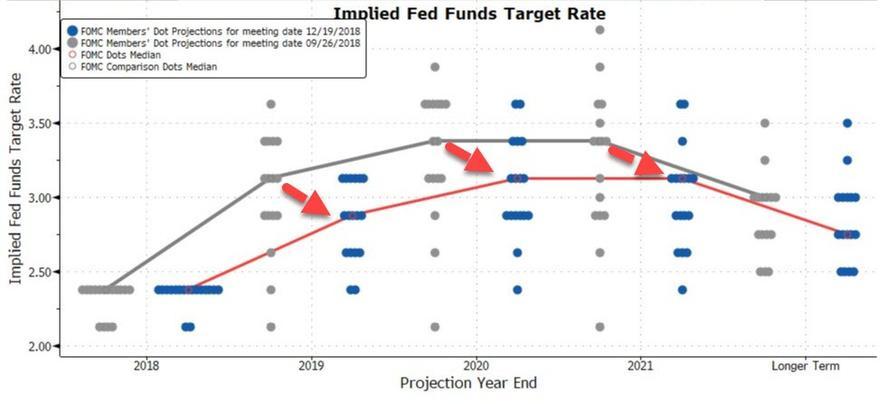Against the wishes of Donald Trump and many investors, the Powell Fed followed through on its projected interest rate hike — its fourth for 2018. The targeted federal funds rate now stands at 2.25 - 2.5, which still remains historically low.
The FOMC announcement did make a slight concession to those worried about it tightening monetary policy too quickly by decreasing the number of projected rate hikes in 2019 from three to two. The dot plot, which illustrates projected future interest rates from FOMC, also indicated a slightly more dovish tone to future monetary policy than was indicated in September.

h/t Zerohedge
While I was critical of Trump’s selection of Powell two years ago, today’s move does paint a contrast between him and his predecessor. Under Janet Yellen, the Fed was marked by its timidity to raise rates in the face of turbulence in stocks and foreign markets — something Powell faced today. Her routine of failing to follow through on projected interest rates hike even forced her to admit that the Fed’s communication tool of forward guidance was rendered impotent.
As Daniel Lacalle noted in his analysis of the Yellen’s record:
Yellen’s legacy is indeed poor. The Federal Reserve, under her mandate, has consistently lagged behind the curve by more than 250 basis points. It has also been very poor when it comes to analyzing the US economy, underestimating inflation, jobs, and growth. Fundamentally, she has been accused of simply perpetuating the measures taken by Bernanke and avoiding taking decisive action to curb extreme complacency in financial markets.
Yellen also overestimated the strength of the job market, ignoring why real wages did not rise despite low unemployment, and completely underestimated the abrupt rise in housing prices. More importantly, she never commented on the rising problem of government spending and debt, increases in taxes and regulation and the negative impact of these factors on key aspects of the economy, particularly wages and investment.
Yellen’s mandate can be summarized in two words: missed opportunity. She arrived when the economy was already healed and growing, and failed to identify the burdens on growth created by excessive debt and taxes. More importantly, she had a fantastic window of opportunity to reduce the $4.5 trillion balance sheet of the Federal Reserve when markets were soaring, and raise rates closer to the inflation level, and decided not to do it, missing a critical window of opportunity.
While Powell may look better than others that came before him, it does nothing to change the issues inherent in central banking, nor the many issues he inherited from the follies of monetary policy past. The global economy continues to be saturated with enormous government, corporate, and personal debt, bubbles, and malinvestment.
For the economy, Winter is Coming and nothing central bankers can do will change that.
Today’s FOMC Statement Compared to Last September:

h/t Zerohedge


